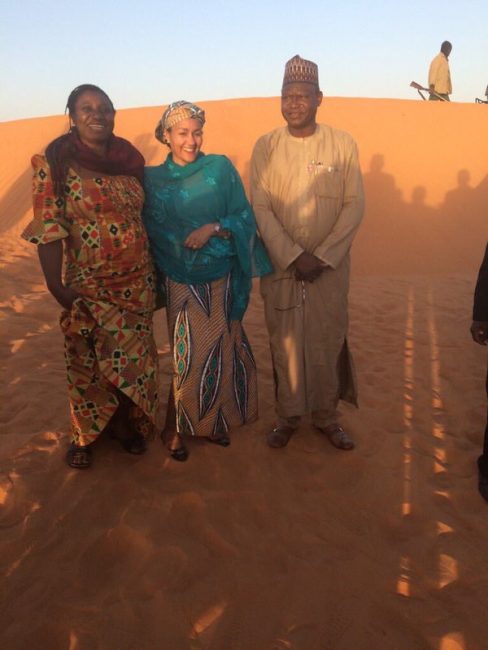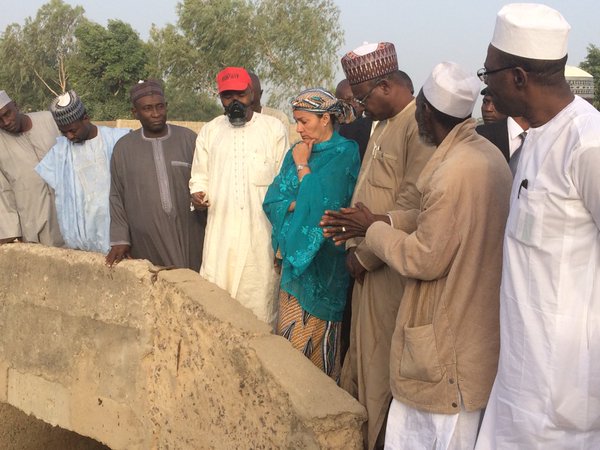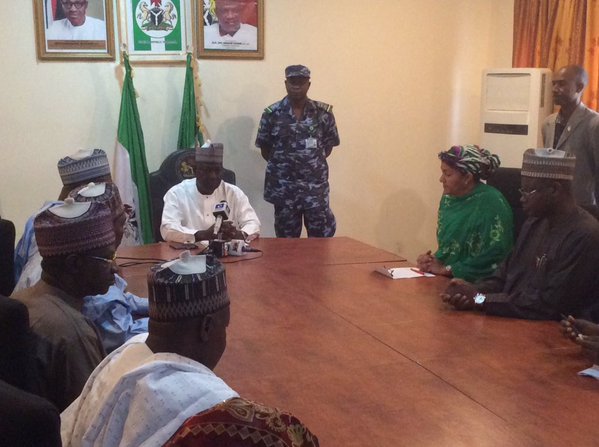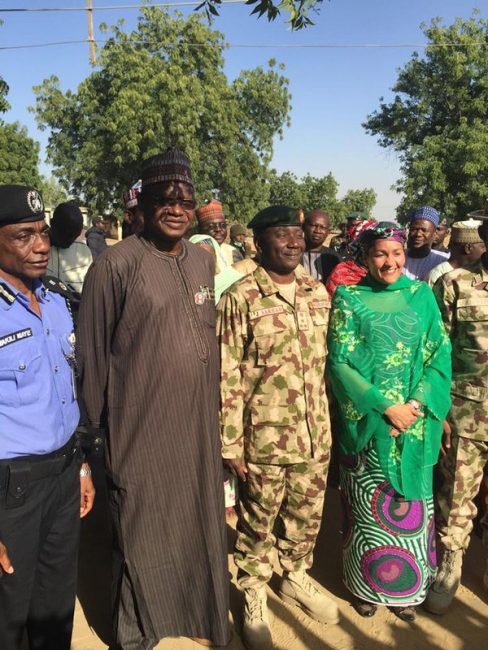Fresh from attending the UN Climate Change Conference in France (that produced the famous Paris Agreement), Environment Minister, Amina Mohammed, embarked on a nationwide tour of environmentally infamous locations in an apparent bid to assess the gravity of the challenges and interact with the concerned communities. The tour took her to states such as Lagos (South West), Imo/Anambra (South East), Rivers (South South), Kano/Jigawa (North West) and Yobe/Borno (North East). This piece highlights her trip to the North West and North East regions.

Kano
On the 18th December, Minister of Environment, Mrs Amina Mohammed, and the Minister of State, with a team made up of the Permanent Secretary, Director General, Great Green Wall, CSOs representative and other staffers of the ministry embarked on an assessment of the environmentally impacted locations the North West Zone of Nigeria. The team was received by the Deputy Governor of Kano State Prof. Hafiz Abubakar. The Minister stated her mission to conduct a rapid assessment to the state of environment to enable her have a first-hand information, for informed decision making, planning and designing intervention strategies at all levels while seeking partnership with the State and Local Government Authorities towards the Change agenda. She underlined the need for genuine collaboration of all stakeholders that will ensure ownership and the sustainability of the investments being made now and in the future that will set the course for empowering people, tackling climate change and protecting the environment.
Prof Abubakar informed his guests of the challenges faced by the state ranging from desertification, industrial pollution and solid waste management as well as the heavily polluted Jankara Dam, which has been a source of livelihood to many.

Sharada Industrial Site
On 19th December 2015, the team visited Sharada Industrial Area and the dump site where there is direct discharge of effluents from tanneries into bodies of water. Most of these wastewaters are extremely complex mixtures containing inorganic and organic compounds. The tannery operation consists of converting the raw hide or skin into leather, which are used in the manufacturing of a wide range of products. Consequently, the tanning industries are potentially pollution-intensive. Aside from the industrial waste, another major environmental issue is the resultant effect from improper disposal and poor management of solid waste which are also dumped on the same vast land in Sharada in Kano and, because of poor management, the waste emits dangerous gases into the atmosphere and bacterial which contains bacteria. The team was informed that though most of the industries are Lebanese, Chinese and Nigeria owned and have primary treatment plants, only few were however functioning and therefore the need for a secondary treatment was of paramount importance and this can only be done with the partnership of federal and state governments, and the industries. The team also visited the tributaries of River Challawa, which is a source of livelihood for millions of people engaged in fishing activities but now heavily polluted with the industrial and solid waste.
Fata Tanning Industry
The team visited the Fata Tanning Industry, one of the biggest industries in Challawa industrial area and was informed that the company was set 10 years ago and deals mostly with skin, and gets its raw materials from Nigeria and the neighbouring countries of Niger, Cameroon and Chad. The team inspected the primary treatment plant but observed the need for the secondary treatment as the effluents from the primary treatment are also discharged directly into the Sharada dump site. It is apparent that so much needs to be done towards ameliorating the industrial and solid waste problems in Kano.
Galadi Desertification Project
Desertification is one of the most serious environmental and socio-economic problems of our time. Desertification describes circumstances of land degradation in arid, semi-arid and dry sub-humid regions resulting from the climatic variation and human activities. In other to address the problem of desertification, the Federal Government of Nigeria along with other countries, put together a programme called the Great Green Wall initiative, the fundamental goal of this programme is to assess the effects of desertification, design and implement projects that would comb the effects of desertification, empower people, build and strengthen the capacity of the communities and enhance their adaptive and indigenous technological ways of addressing the problems in the 11 frontline states in the northern region of Nigeria and the neighbouring countries.
It is to be noted that the present threat of desertification in the Sahel has reached an alarming stage where crops cultivation and animal rearing/grazing are no more productive, soil has lost its nutrient/fertility, various infrastructure have given way because of windstorm from the neighbouring Niger Republic and sand dunes have taken over. The team visited one of the GGW projects located in Galadi, Jigawa State to access the level of implementation.
Hadejia Nguru Wetland
The Hadejia-Nguru Wetlands is a part of the flood plain of the Komadougou-Yobe River Basin in the Lake Chad basin in the north-east of Nigeria and is considered to be a source of livelihood to probably about 25 million people to an internationally shared water whose management has an important bearing on diplomatic relationships between Nigeria and four neighbouring countries that share the Lake Chad Basin (Niger, Cameroon, Chad and Central African Republic).
The wetlands have formed where the waters of the Hadejia and Jama’are rivers meet the lines of ancient sand dunes aligned northeast-southwest. An area of confused drainage has formed here, with multiple river channels and a complex pattern of permanently and seasonally flooded land and dryland. The wetlands are nationally and internationally important for migratory waterfowl. The wetlands support extensive wet-season rice farming, flood-recession agriculture and dry-season irrigation. The flood plain also supports large numbers of fishing communities most of whom also farm, and is grazed by very substantial numbers of Fulani livestock, particularly cattle, which are brought in from both north and south in the dry season. There is also an important dispatch from the wetlands of fuelwood and fodder for horses. In view of the importance attached to this wetland which is being heavily impacted by the climate change effects, the Minister and her team felt, it was important to visit the area.
Head of the Great Green Wall project explained that over the years the wetlands have been affected by developments some attributed to the construction of the Tiga Dam on a tributary of the Hadejia River in the early years of the 1970s which has exacerbated the effects of the low rainfall of the last two decades. The result has been a reduction in the extent of flooding in the wetland. The growth of human population throughout the region is a reality that has led to increased agricultural activity to feed the teeming population, combined with changing climatic patterns over the years, the result has been an increased pressure on water resources in the basin.
One consequence to changes in the flow pattern of the river is increased siltation, particularly around the Hadejia-Nguru wetlands areas. Invasive Typha grass, which has flourished in the regulated river, has compounded the problem, leading to flooding of the major road linking the six states. Poor management of the dams also often results in excessive flooding of farmlands, schools and villages, leading to loss of lives and properties. The problems in the Nguru Wetland are also part of the broader regional problems with managing water resources, Lake Chad itself is in critical condition, and has shrunk to just a tiny fraction of its historical size.
Karasawa LGA
Fajanari community has an estimated population of 1,000 and, based on the population and in order to ameliorate the sufferings of the community people, the GGW decided on a project site where a borehole powered with solar was sunk to serve the community. However, the leader of the Association stated that the water in the borehole is not enough to cater for livestock, crop cultivation, household chores as well as other domestic purposes. The farming programmes including planting of economic trees such as jatropha, mangoes, guava and local tobacco which is used for cosmetics.
According to the leader of the Karasawa Garina Guna Development Association, there is an urgent need for extensive training for the maintenance of the borehole as well as extension service workers, but most importantly provision of staff salaries. The journey to the the highest point of sand dunes took the team approximately three hours without any direct access road.
The minister said: “I really want to know the coping and adaptive initiatives of the communities especially women that have lived long with the menace of sand dunes and how I can enhance their indigenous technology and coping strategies.”

Yobe State
On the 20th December 2015, the team visited the Yobe State seat of power in Damaturu and was received by the Deputy Governor, Dr. Ibrahim Gaidam. Stating her mission to see, hear, feel and understand the adaptive strategies of the people, the minister informed Dr Gaidam that her objective stems from the fact that her ministry cannot do it alone but must partner with the state and local governments, CSOs, media, private sector and all other stakeholders in addressing the challenges and the change agenda of the government. She commended the people of Yobe State for staying strong despite the numerous environmental and socio-political challenges on ground.
Responding, the Deputy Governor thanked and applauded the ministers, stating that it was the first time a minister dared to travel to the desert encroached areas of Yobe despite the insecurity in the state. He enumerated some of the programmes that the state has designed to assist the people to include: tree planting, afforestation and reforestation, siblings and nursery production, distribution free of charge to CSOs, CBOs community members, woodlot production, shelterbelt production to protect farm lands and degraded soil, building capacity of farmers on wind erosion harvesting, boarder line farming and natural rejuvenation farming, oasis, a term used for shifting cultivation, gum Arabic, alternative sources of energy-briquetting stove, kerosene stove, saw dust stoves, gas cookers, and short term embankment along the tributaries of Lake Chad. According to him, the state also has programmes that specifically target women and these include working capital, enterprises training for young girls, including those out of school and illiterates.

Baga Community
On the 20th December, 2015, the team in the company of the Deputy Governor of Borno State (Usman Durkwa), the Senator representing the area, the General Officer Commanding (Gen. Adesoun), journeyed to Baga community to see the Lake Chad tributaries and what has really become of it and what measures can be taken to address the situation.
The three-hour journey from Maiduguri took the team to Baga but could only stop by one of the tributaries as the entourage was warned against going any further from the point reached. Baga is a community that has been sacked by the Boko Haram insurgency and has since become a war zone involving the Nigerian Army and Boko Haram.
Findings
- Desertification, which is affecting the 11 northern states, is considered as the most pressing environmental problem and accounts for about 73% out of the estimated total cost of about $5.110 billion per annum the country is losing arising from environmental degradation
- Millions of Nigerians have lost their source of livelihoods due to climate change and environmental problems. However, some of them are man-made.
- For decades the people from the northern Nigerian have lived with the menace of desertification and have used different mitigation and adaptive strategies which needs to be researched and promoted.
- The activities of Boko Haram and indeed the violent conflicts in the region has hindered development, as development cannot strive in an environment that is not conducive.
- The tributaries from Baga leading up to Lake Chad which in the past was a source of livelihood for millions of people is severely affected by the impact of climate change. It is drying up and has displaced many, thus forcing them to migrate to greener pastures with its attendant consequences.
- The problems in the Nguru Wetland basin are part of a broader regional problem with managing water resources; Lake Chad itself is in critical condition, and has shrunk to just a tiny fraction of its original size.
- The Hadejia-Nguru Wetlands – not only is it the premier Ramsar site in Nigeria but also a place of enormous economic and ecological importance to millions of people.
- The result of the human factor has remained the major cause of desertification. Most of the arable land had been over-cultivated and also the land reserved for animal grazing had been subsumed by farmers leaving no portion for animal grazing. Most of the trees are either cut down for crop cultivation or for cook fuel.
Way out
- There is also an urgent need to have a tripartite programme of dealing with the industrial waste which is a time bomb for the majority of the Kano residents.
- Need to conduct research into the adaptive strategies of the communities especially in the desert prone areas of Yobe where sand dunes have taken over most parts of the state is urgently needed. This would provide information on how best to enhance the indigenous technology of dealing with the situation, while devising different strategies of solving the problems.
- Public participation generates tangible benefits, by fostering cooperation in developing and implementing strategic actions.
- Good political will involving the countries affected by the Lake Chad impact is imperative to back up sustainable development in the basin
- To stop tree felling as a means of cooking fuel the government and indeed the private devise alternatives sources of renewable energy such conversion of animal waste into biogas, briquettes, fuel efficient stoves and cooking gas at a very subsidized rate for the people to be able to afford.
- Afforestation and reforestation programmes are vital. In addition to producing fuelwood, the forest reserves and bushland of the flood plains yield important non-timber forest products that are significant to the livelihoods and subsistence of local communities. Some, including leaves, are important marketed commodities that generate substantial income.
Conclusion
It is globally acknowledged that environmental problems such as greenhouse warming, ozone depletion, soil erosion, desertification, chemicals management, acidic rain and water pollution, among others are directly or indirectly caused by the creation, operation, or disposal of the built environment undertaken by man. Climate change stress is leading almost directly to social stress; as resources decrease and human populations increase, migration and social fragmentation accelerate. These problems cannot be solved by government alone, but with the inclusion of all stakeholders.
By Priscilla Achakpa (Executive Director, Women Environmental Programme)
